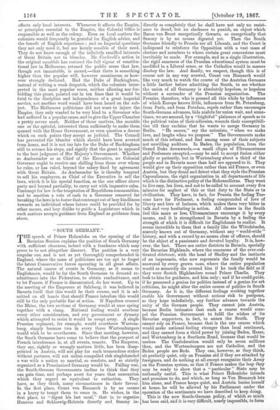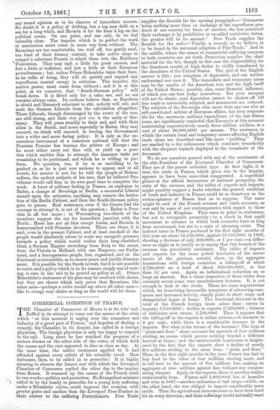" SOUTH GERMANY."
THE speech of Prince Hohenlohe on the opening of the Bavarian Session explains the position of South Germany with sufficient clearness, indeed with a frankness which may prove to be not altogether discreet. The position is a very singular one, and is not as yet thoroughly comprehended in England, where the mass of politicians are too apt to forget the latent Conservative forces operating in all great affairs. The natural course of events in Germany, as it seems to Englishmen, would be for the South Germans to demand re- admittance into the Federation, to obtain readmittance, and to let France, if France is discontented, do her worst. Up to the meeting of the Emperors at Salzburg, it was believed in Bavaria itself that this would be their course, and it is ad- mitted on all hands that should France interfere this would still be the only probable line of action. If Napoleon crossed the Rhine, the two sections of Germany would at once spring together with a clang. National feeling would overbear every other consideration, and any government or dynasty which attempted to resist it would be swept away. A single Prussian regiment, for example, would overthrow Wurtem- burg, simply because two in every three Wurtemburgers would wish to be overthrown. Since that meeting, however, the South Germans have come to believe that the prospect of French interference is, at all events, remote. The Emperor, they say, rightly or wrongly matters little, has been disap- pointed in Austria, will not play for such tremendous stakes without partners, will not unless compelled risk singlehanded a war with a nation so martial, so resolute, and so strictly organized as a Prussianized Germany would be. Failing war, the South-German Governments incline to think that they can gain time, and perhaps avert for years that annexation which they regard as equivalent to extinction. They have, as they think, many circumstances in their favour. In the first place, Count von Bismarck is by no means in a hurry to tempt them to come in. He wishes, in the first place, to "digest his last meal," that is, to organize Hanover and Schleswig-Holstein directly and Saxony in- directly so completely that he shall have not only no resist- ance to dread, but no slackness to punish, an object which Baron von Beust energetically thwarts, so energetically that Saxony is by no means digested yet. Then the South Germans friendly to Prussia are all Liberals, and the Court is indisposed to reinforce the Opposition with a vast mass of electors and members to whom certain great concessions must inevitably be made. For example, and as a single illustration, the rigid sameness of the Prussian educational system must be modified in a Liberal sense, or the Catholics would in masses disobey the law. And finally, we suspect, though this is of course not in any way avowed, Count von Bismarck would like very much to watch the course of the Austrian Germans a little farther before admitting the South, to see whether the union of all Germany is absolutely hopeless, or hopeless without a surrender of the Prussian organization. The Premier, therefore, who is pressed all this while by influences of which Europe knows little, influences from St. Petersburg, from Paris, and from Potsdam, repels rather than encourages South-German advances, bids zealots for union wait, and some- times, we are assured, by a "frightful" plainness of speech as to the political value of their adhesion, wounds their susceptibili- ties till they exclaim that he wants to merge Germany in Berlin. " He sneers," say the unionists, " when we make love, and laughs when we propose." The Governments make much of this refusal, and find among some of their subjects not unwilling auditors. In Baden, the population, from the Grand Duke downwards,—a small clique of Ultramontanes and Professors excepted,—may be said to accept fusion either gladly or patiently, but in Wurtemburg about a third of the people and in Bavaria more than half are opposed to it. They would give up their opposition rather than aid France, or even Austria, but they dread and detest what they style the Prussian Caporalismus, the rigid organization in all departments of life which is the distinctive policy of the Hohenzollerns. They want to live easy, lax lives, and not to be called to account every five minutes for neglect of this or that duty to the State or to civilization. They have, in fact, for Prussia the feeling Tus- cans have for Piedmont, a feeling compounded of love of liberty and love of laziness, which makes them very bitter in talk and very hesitating in action. All classes in the South feel this more or less, Ultramontanes encourage it by every means, and it is strengthened in Bavaria by a feeling the strength of which it is difficult for Englishman to realize. It seems incredible to them that a family like the Wittelsbachs, scarcely known out of Germany, without any " world-wide " history, and with a record by no means clear of offence, should be the object of a passionate and devoted loyalty. It is, how- ever, the fact. There are entire districts in Bavaria, specially the Bavarian Highlands, where the summons of the over-cul- tivated dilettante, with the head of Shelley and the instincts of an impresario, who now represents the family would be answered by every grown man, where the entire population would as assuredly die around him if he took the field as if they were Scotch Highlanders round Prince Charlie. They look to him for guidance, and him only ; and if he could guide, if he possessed a genius for politics instead of a genius for art criticism, he might alter the entire course of polities in South Germany. As it is, the different feelings working together enable his Government without serious risk to postpone, as they hope indefinitely, any further advance towards the unity of the German people. They cannot join Austria, because Berlin intimates that such a course would com- pel the Prussian Government to fulfil the wishes of its Bavarian supporters, in fact, to annex the South. They cannot rely on France, because that is the one course which would make national feeling stronger than local sentiment, and they cannot form a third power by joining Baden, Hesse, and Wurtemburg in a Southern Band, because that would be useless. The Confederation would only be seven millions then, and the Wurtemburgers are not Catholics, and the Baden people are Reds. They can, however, as they think, sit perfectly quiet, rely on Prussian aid if they are attacked by foreigners, and do nothing at all except reorganize their Army on the Prussian system, so that if France makes the leap they may be ready to show that a " particular " State may be nationally useful. This is what Prince Hohenlohe intends and promises to do, and which, so long as Von Bismarck lets him alone, and France keeps quiet, and Austria busies herself at home, he will be allowed by his Parliament under the operation of the sentiments we have described to keep doing. This is the new South-German policy, of which so much has been said, and it is very difficult, nearly impossible, to form any sound opinion as to its chances of immediate success. No doubt it is a policy of drifting, but a log may drift on a sea for a long while, and Bavaria is for the hour a log on the political ocean. On one point, and one only, do we feel tolerably clear. The impulse which is to perfect the work of annexation must come in some way from without. The Bavarians are too comfortable, too well off, too gently used, too fond of their dreamy content, to take active steps to , compel a reluctant Prussia to admit them into the Northern 'federation. They may sigh a little for great careers, and fret a little at isolation, and jest a little at their European powerlessness ; but, unless Prince Hohenlohe taxes their beer, as he talks of doing, they will sit quietly and expend any superfluous mental energy in criticism. The impulse, the motive power, must come from without ; and it is at this point, as we conceive, that " South-German policy " will break down. It is fitted only for a calm sea, and no sea remains always calm. Its authors believe that, as Napoleon is afraid and Bismarck reluctant to stir, nobody will stir, and omit the German Liberals from the calculation altogether. Those Liberals, though discouraged by the event of the war, are still strong, and their sine qua non is the unity of Ger- many. They will press steadily to their end, and with their allies in the South, and more especially in Baden, they may succeed, we think will succeed, in forcing the Government into a wider and more daring policy. It is only as the un- conscious instrument of a conscious national will that the Prussian Premier has become the arbiter of Europe ; and he must either carry out that will, or yield up a posi- tion which enables him to attempt the immense tasks yet remaining to be performed, and which he is willing to per- form. We question, too, if he is so unwilling to be pushed on as he is just now anxious to appear, and at all events, his master is not, for he told the people of Hohen- zollern, the earliest subjects of his race, that he believed Pro- vidence would call him in its own good time to complete the work. A burst of military feeling in France, an explosion in Baden, a change of Sovereign at Berlin, a successful Liberal assault upon the estimates, anything may remove the hesita- tion of the Berlin Cabinet, and then the South-German policy goes to pieces. Real resistance, even if the Courts had the courage to attempt it, is out of the question ; Baden is Prus- sian in all but name ; in Wurtemburg two-thirds of the members support the cry for immediate junction with the North ; Hesse has not an idea except fusion, and Bavaria is honeycombed with Prussian devotees. There are three, it is said, even in the present Cabinet, and at least one-half of the people would absolutely refuse to resist any energetic pressure towards a policy which would realize their long cherished ideal, a German Empire stretching from Italy to the ocean, from the Vistula to Holland, with one Emperor, one Parlia- ment, and a homogeneous people, free, organized, and on the Continent so irresistible, as to ensure peace and justify disarma- ment. It is possible for the South to wait, but it is not possible to resist, and a policy which is in its essence simply one of wait- ing, is sure in the end to be proved no policy at all. Prince Hohenlohe's statement of his plan may be received with cheers, but they are cheers which only prove that Bavarians, like other men—perhaps a critic would say above all other men— like to occupy easy chairs as long as the world will let them.































 Previous page
Previous page